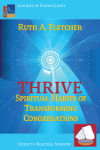Pastor Searches and Job Interviews
Church politics is necessary. Even those who most avoid it live with it. What we must work toward is a way of making decisions in the church that isn’t just a pale reflection of the way things are done in the world.
One of the ways we create a pale reflection is by doing what the world does, only doing it less effectively. Growing up, I was informed regularly that the church functioned democratically. I could see, however, that it was much more of an oligarchy. Why? Because while the church wanted to carry out activities by vote, they didn’t want the discussion and potential acrimony that went with it. For a church such as the Seventh-day Adventist Church, which I grew up in, or the United Methodist Church, of which I am a part now, this “peaceful” approach, in which members vote for what the leaders have decided, generally breaks down as you move up the chain. In that breakdown, local church members see a great divide between what they would have wanted and what their church is doing.
 The form of democracy, without a lively dialogue and exchange of ideas on issues, doesn’t really function much like democracy. There are doubtless many reasons why we might not want actual democracy in the church, though the priesthood of all believers does tend to imply that more people have influence.
The form of democracy, without a lively dialogue and exchange of ideas on issues, doesn’t really function much like democracy. There are doubtless many reasons why we might not want actual democracy in the church, though the priesthood of all believers does tend to imply that more people have influence.
Thom Rainer, in a post titled FIVE QUESTIONS PROSPECTIVE PASTORS RARELY ASK SEARCH COMMITTEES (BUT SHOULD), perhaps unintentionally highlights this problem with a pastor search. A pastor search is like a job search, only with spiritual veneer. So we sometimes avoid talking about the things that we really should be interested in and pretend the situation is other than it really is. (I should note that businesses are also very much subject to doing the job badly, though usually for different reasons than the church.)
In her book Thrive: Spiritual Habits of Transforming Congregations, Ruth Fletcher discusses discernment frequently. She says,
In transforming congregations, leadership teams meet frequently to talk about what the Spirit seems to be doing in the congregation and to notice where the Spirit seems to be guiding the church to go. They keep their own sand moist by engaging daily in the spiritual habit of prayer, and practice the spiritual habit of discernment in their personal lives. They discipline themselves to open their minds to new understandings, to open their hearts to the plight of their neighbors, and to open their wills by setting aside their own agenda in order to seek God’s new creation. (p. 119)
Provided the church congregation believes it should have a paid pastor at all, this would seem like a good approach. Talk about what the Spirit is doing. Engage in the “spiritual habit of prayer” and the “spiritual habit of discernment.” Set aside “their own agenda.”
What would it look like in a church if the process of filling roles or offices in the church was a process jointly of congregational leaders and candidates setting aside their own agenda and discerning what the Spirit is saying to their church?